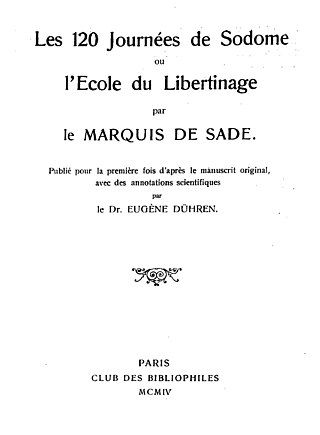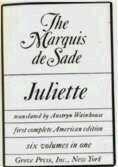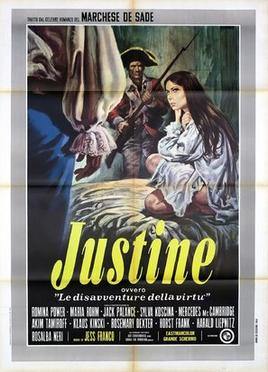
The 120 Days of Sodom, or the School of Libertinage is an unfinished novel by the French writer and nobleman Donatien Alphonse François, Marquis de Sade, written in 1785 and published in 1904 after its manuscript was rediscovered. It describes the activities of four wealthy libertine Frenchmen who spend four months seeking the ultimate sexual gratification through orgies, sealing themselves in an inaccessible castle in the heart of the Black Forest with 12 accomplices, 20 designated victims and 10 servants. Four aging prostitutes relate stories of their most memorable clients whose sexual practices involved 600 "passions" including coprophilia, necrophilia, bestiality, incest, rape, and child sexual abuse. The stories inspire the libertines to engage in acts of increasing violence leading to the torture and murder of their victims, most of whom are adolescents and young women.

Pierre Ambroise François Choderlos de Laclos was a French novelist, official, Freemason and army general, best known for writing the epistolary novel Les Liaisons dangereuses (1782).

Nicolas Restif de la Bretonne, born Nicolas-Edme Rétif or Nicolas-Edme Restif, also known as Rétif, was a French novelist. The term retifism for shoe fetishism was named after him. The man was also reputed to have coined the term "pornographer" in the same-named book, The Pornographer.

Juliette is a novel written by the Marquis de Sade and published 1797–1801, accompanying de Sade's 1797 version of his novel Justine. While Justine, Juliette's sister, was a virtuous woman who consequently encountered nothing but despair and abuse, Juliette is an amoral nymphomaniac murderer who is successful and happy. The full title of the novel in the original French is L'Histoire de Juliette ou les Prospérités du vice, and the English title is "Juliette, or Vice Amply Rewarded". As many other of his works, Juliette follows a pattern of violently pornographic scenes followed by long treatises on a broad range of philosophical topics, including theology, morality, aesthetics, naturalism and also Sade's dark, fatalistic view of world metaphysics.

Justine, or The Misfortunes of Virtue is a 1791 novel by Donatien Alphonse François de Sade, better known as the Marquis de Sade. Justine is set just before the French Revolution in France and tells the story of a young girl who goes under the name of Thérèse. Her story is recounted to Madame de Lorsagne while defending herself for her crimes, en route to punishment and death. She explains the series of misfortunes that led to her present situation.

Philosophy in the Boudoir is a 1795 book by the Marquis de Sade written in the form of a dramatic dialogue. Set in a boudoir the two lead characters make the argument that the only moral system that reinforces the recent political revolution is libertinism, and that if the people of France fail to adopt the libertine philosophy, France will be destined to return to a monarchic state. In the chapter titled "Fifth Dialogue", there is a lengthy section where the character Chevalier reads a philosophical pamphlet titled "Frenchmen, Some More Effort If You Wish To Become Republicans". The pamphlet clearly represents Sade's philosophy on religion and morality, a philosophy he passionately hopes the citizens of France will embrace and codify into the laws of their new republican government. Continually throughout the work, Sade makes the argument that one must embrace atheism, reject society's beliefs about pleasure and pain, and further makes his argument that if any crime is committed while seeking pleasure, it cannot be condemned.

Sade is a 2000 French film directed by Benoît Jacquot, adapted by Jacques Fieschi and Bernard Minoret from the novel La terreur dans le boudoir by Serge Bramly.

Iwan Bloch, also known as Ivan Bloch, was a German dermatologist, and psychiatrist, psychoanalyst born in Delmenhorst, Grand Ducal Oldenburg, Germany, and often called the first sexologist.
The libertine novel was an 18th-century literary genre of which the roots lay in the European but mainly French libertine tradition. The genre effectively ended with the French Revolution. Themes of libertine novels were anti-clericalism, anti-establishment and eroticism.
Dialogue Between a Priest and a Dying Man is a dialogue written by the Marquis de Sade while incarcerated at the Château de Vincennes in 1782. It is one of the earliest known written works from de Sade to be dated with certainty, and was first published in 1926 together with an edition of Historiettes, Contes et Fabliaux. It was subsequently published in English in 1927 by Pascal Covici in a limited, hand-numbered edition of 650 copies.

There have been many and varied references to the Marquis de Sade in popular culture, including fictional works, biographies and more minor references. The namesake of the psychological and subcultural term sadism, his name is used variously to evoke sexual violence, licentiousness and freedom of speech. In modern culture his works are simultaneously viewed as masterful analyses of how power and economics work, and as erotica. Sade's sexually explicit works were a medium for the articulation of the corrupt and hypocritical values of the elite in his society, which caused him to become imprisoned. He thus became a symbol of the artist's struggle with the censor. Sade's use of pornographic devices to create provocative works that subvert the prevailing moral values of his time inspired many other artists in a variety of media. The cruelties depicted in his works gave rise to the concept of sadism. Sade's works have to this day been kept alive by artists and intellectuals because they espouse a philosophy of extreme individualism that became reality in the economic liberalism of the following centuries.

That Night in Varennes is a 1982 French-Italian drama film directed by Ettore Scola. It is based on a novel by Catherine Rihoit. It tells the story of a fictional meeting among Restif de la Bretonne, Giacomo Casanova, Thomas Paine and Sophie de la Borde. They are all traveling together in a coach that is a few hours behind the one that is carrying King Louis XVI and Marie Antoinette in their flight to Varennes during the French Revolution.
Austryn Wainhouse was an American author, publisher and translator, primarily of French works and most notably of the Marquis de Sade. He sometimes used the pseudonym Pieralessandro Casavini.

Marquis de Sade: Justine is a 1969 erotic period drama film directed by Jesús Franco, written and produced by Harry Alan Towers, and based on the 1791 novel Justine by the Marquis de Sade. It stars Romina Power as the title character, with Maria Rohm, Klaus Kinski, Akim Tamiroff, Harald Leipnitz, Rosemary Dexter, Horst Frank, Sylva Koscina and Mercedes McCambridge.
Donatien Alphonse François de Sade, best known as the Marquis de Sade, was a French aristocrat, revolutionary and author of philosophical and sadomasochistic novels exploring such controversial subjects as rape, bestiality and necrophilia. His works evidence a philosophical mind advocating a materialist philosophy in which Nature dictates absolute freedom, unrestrained by morality, religion or law, with the pursuit of personal pleasure as its foremost principle. Besides novels, he wrote philosophical tracts, novellas, short stories, and a number of plays. Publication, dissemination, and translation of his works have long been hindered by censorship: not until 1983 were his works allowed unfettered distribution in the UK, for instance.

Donatien Alphonse François, Marquis de Sade was a French writer, libertine, political activist and nobleman best known for his libertine novels and imprisonment for sex crimes, blasphemy and pornography. His works include novels, short stories, plays, dialogues, and political tracts. Some of these were published under his own name during his lifetime, but most appeared anonymously or posthumously.
Anne-Hyacinthe de Saint-Léger de Colleville was a French novelist and dramatist.

Mathieu-François Pidansat Mairobert was a French writer.
Softly from Paris is a 1986–1991 erotic French television series produced by Pierre Grimblat and initially broadcast on France 3. 26 episodes of 28 minutes each were produced.

La Passion selon Sade is an opera by Sylvano Bussotti who also wrote the libretto, and was the set designer and director. The subtitle is "mistero da camera", describing it as a chamber mystery play. It was Bussotti's first work for the stage. The opera premiered in 1965 in Palermo with soprano Cathy Berberian, who portrayed the titular characters from two novels by the Marquis de Sade, Justine and Juliette. It has been regarded as experimental musical theatre in several respects.













